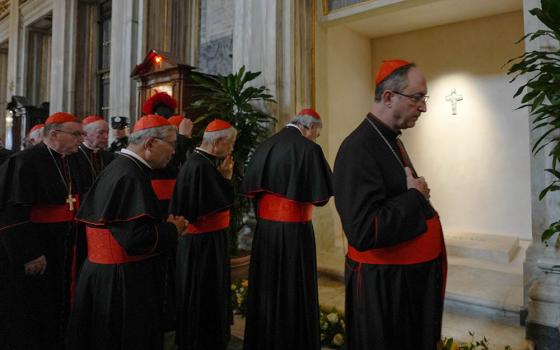 DISTANT NEIGHBORS: THE SELECTED LETTERS OF WENDELL BERRY AND GARY SNYDER
DISTANT NEIGHBORS: THE SELECTED LETTERS OF WENDELL BERRY AND GARY SNYDER
Edited by Chad Wriglesworth
Published by Counterpoint, $16.95
"I'm not interested in spirituality that is dependent on cheap fossil fuel, soil erosion, and air pollution," writes Wendell Berry in Distant Neighbors, a fascinating collection of letters between the Kentucky farmer-writer and the Zen poet Gary Snyder -- two crucial, if quite different, voices in this perilous ecological age.
"No use talking about getting enlightened or saving your soul if you can't keep the topsoil from washing away," Berry tells Snyder.
Amid the renewed energy generated by Pope Francis' environmental encyclical "Laudato Si', on Care for our Common Home," it would be prudent to heed the wisdom of these eco-literary giants, whose poetry, prose and activism over the last several decades have been consistently rooted in their work with and love of the land.
Berry and Snyder's ideas have influenced the now-trendy "locavore" movement, with its farmers markets, community-supported agriculture, and local breweries. But the more compelling power of these letters lies in their demonstration of the authors' belief that the material world is profoundly sacred: Theirs is a quest to reconnect ecology with religion, body with soul, topsoil with salvation, house-holding with enlightenment. As Snyder declares in one letter, "Subsistence equals Sacrament."
Snyder first initiated contact with Berry in 1973 while reading Berry's A Continuous Harmony "between building a hen-house, tending bees, cutting firewood" and studying the origins of religion. Snyder had recently settled with his family in an off-grid home, dubbed "Kitkitdizze," in the foothills of the Sierras in California.
On the other side of the country, Berry, along with his wife and children, had planted roots in the Kentucky River Valley on a 12-acre homestead they called "Lane's Landing Farm." Both writers chose to turn their backs on urban literary careers to instead live lives that integrated the mind with the body.
This collection of nearly 250 letters, therefore, is not a parade of theories of two academics stuck in the ivory tower. Rather, it depicts two fierce, intellectual activists who encourage and challenge one another amid their gritty lives on the land. Now octogenarians, both continue to work the same pieces of ground.
Naturally, throughout their correspondence, Berry and Snyder touch on the quotidian realities of their lives -- family updates, speaking tours ("a difficult way to discover what it means to be a homebody," Berry wryly comments), and the omnipresent weather updates ("We're dry here," "Snow melting now," "We've had a fairly warm winter here").
Though they also touch on an array of topics -- such as Amish social organization, indigenous culture, right occupation, appropriate technology, and birth control -- the letters never linger too long in the abstract. The insights of these writer-homesteaders are always punctuated by the experience of their decadeslong interaction with their local ecologies. (After a long epistle on civilization, Christian Zen and the problems of Christianity, for example, Snyder suddenly asks for advice about the use of tractors and rototillers.)
On the topics of spirituality, theology and agriculture, however, these allies find much to quibble about, and this is where the book crackles most. Theirs is a fascinating form of interreligious dialogue intertwined with ecological insights.
Snyder, who is most sympathetic to the hunter-gatherer "old ways" of primitive society, is critical of Berry's Christianity; he sees it as a religion "that says the living creatures of the earth are 'meat' for our use" and encourages too rigid a distinction between "creator and creation."
Moreover, Snyder argues with Berry's agrarianism, which he believes can't escape the inevitable "monoculture."
Berry, a self-described "forest Christian," responds with a brilliant discussion that covers the Book of Job, Lao Tzu, topsoil, high and low culture, Japanese Zen, the authority of the individual conscience, and more. (Berry provides an even more cogent argument in his essays "The Gift of Good Land" and "Christianity and the Survival of Creation.")
While there are certainly tensions between Berry and Snyder, what makes this collection of their letters so valuable is what unites them. Both are troubled by what Berry calls "feckless, dainty, bodiless, brainless spirituality." They agree that spirituality is only real to the extent that it is attuned to the material world.
Over the four decades of their correspondence, they continued to grapple with what makes for the good life. Berry humbly remarks to his friend: "Our work must settle for being, at best, a fragment of a glimpse of a better possibility."
Those who seek to deepen their understanding of the ways in which sustainability is bound up with spirituality will be grateful for the glimpses that Berry and Snyder have provided.
[Eric Anglada lives on New Hope Catholic Worker farm, near Dubuque, Iowa.]


